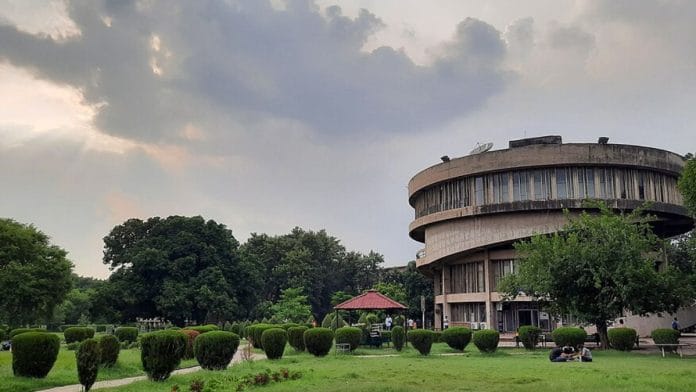New Delhi: Amid controversy over the Centre’s move to restructure Panjab University’s senate and syndicate, university officials clarified Monday that the decision is lawful and Section 72 of the Punjab Reorganisation Act 1966 gives the Centre authority over the inter-state university.
The senate is Panjab University’s top policy-making body, while the syndicate is its executive body, handling day-to-day administration.
A political controversy erupted in Punjab, following the Centre’s 28 October notification, amending the Panjab University Act, 1947.
The notification reduced the members of the university’s senate from 90 to 31, abolished the graduates’ constituency entirely, and replaced its elected syndicate with a mostly nominated structure. The syndicate will now be an administrative council, with no accountability to the senate and members largely nominated. Earlier, the senate elected them from among its fellows.
Punjab Chief Minister Bhagwant Mann slammed the Centre’s move as “totally unconstitutional”, declaring that his government would take the matter to court.
However, officials at Panjab University told ThePrint that the move is “lawful” and that “there is no illegality in this”.
“Punjab University is an ‘inter-state body corporate’ under the Punjab Reorganisation Act, 1966, passed by Parliament, having participation from the states of Punjab, Haryana, and Himachal Pradesh,” a senior university official told ThePrint.
Regarding the Centre’s role, the official explained: “The central government (MHA), in exercise of the powers conferred under Section 72 of the Punjab Reorganisation Act, 1966, carried out an amendment dated 1.11.1966 in the Punjab University Act, 1947, thereby substituting the word ‘government of Punjab’ with ‘central government’.”
“In exercise of the powers conferred by sub-sections (1), (2), and (3) of Section 72, the central government has issued these modifications, and there is no illegality in this. The central government is competent to give such directions, which also pertain to governance…There was no need to pass it through the Parliament,” the official added.
Also Read: ‘Milestone’ pact after 3 years of resistance—the debate over PM-SHRI & what’s behind Kerala’s U-turn
The amendments
The recent gazette notification invokes Section 72 of the Punjab Reorganisation Act, 1966, which allows the Centre to amend state laws governing inter-state institutions, through “exceptions and modifications.”
The composition of the senate has dropped from 90 to 31 members. The earlier structure had 47 elected fellows from various categories, including the graduates’ constituency, as well as the nominated and ex officio members. But now, elected representation has been limited, and the senate will have a combination of nominated and ex officio members.
Additionally, seven ex officio members will be in the senate—Punjab CM, Chief Justice of Punjab and Haryana High Court, and Punjab education minister, as earlier, along with the two new entrants, the education secretary of Chandigarh and the Chandigarh MP.
Two eminent alumni, two professors, two associate or assistant professors, four principals, six college teachers, and two MLAs will be nominated to the senate as the ordinary fellows by the Punjab assembly Speaker. Their four-year terms will require the approval of the Punjab University Chancellor.
Earlier, there were only five ex officio members.
The most controversial change is the complete abolition of the graduates’ constituency. In the previous 90-member senate, 47 fellows were elected, including 15 chosen by the university graduates who registered as senate voters. Now, two eminent university alumni will be nominated by the Chancellor—the Vice President of India—in the case of Panjab University.
Logic behind them
According to university officials, the senate’s large size and election-oriented processes had often prioritised politics over academics.
“Elections, involving registered graduates, faculty, and principals, often led to delays and factionalism. Since registered graduates include anyone who has passed out or enrolled at the university—running into lakhs, with new graduates added each year—it became extremely difficult to carry out academic activities,” said another university senior official. Adding, “the voters’ list was revised only every four years ahead of senate elections.”
“Now, the earlier 15 registered graduate seats have been replaced with two alumni nominated by the Chancellor,” the official said.
The official said that during its 2015 visit, the National Assessment and Accreditation Council (NAAC) specifically observed that “governance structure, especially in terms of appointments of faculty deans, should be revisited”.
“The Panjab University Teachers’ Association (PUTA) had also approached the then Union Home Minister, Shri Rajnath Singh, on 7 September 2016, urging governance reforms. Compared to central universities, IITs, IIMs, and state-run universities, Panjab University’s senate and syndicate are far more complex, time-consuming, and costly to institute,” the official said.
The National Education Policy 2020 urges higher education institutions to reform governance to foster “a culture of excellence and innovation”, and the University Grants Commission has asked universities to implement relevant reforms.
“If Panjab University has to achieve its innate potential and grow into a front-ranking university, it is imperative that it should streamline its governance system. What is required is a lean and efficient governance structure that draws on the best governance practices from within the state and outside,” the official, quoted first, said.
Responding to Mann’s allegations that the state government largely funds the university, the first official said, “In FY 2024-25, Rs 593.62 crore (86.78%) was released by the central government and Rs 90.49 crore (13.22%) by the government of Punjab. The internal revenue generation (IRG) of Panjab University was Rs 355.18 crore in FY 2024-25.”
Officials said that in February 2021, then-Chancellor of Panjab University M. Venkaiah Naidu formed an 11-member governance reforms committee that conducted extensive consultations and suggested changes in line with the NEP 2020. “The committee submitted its report to the ministry, which further consulted the law department before making this amendment,” the second official added.
(Edited by Madhurita Goswami)
Also Read: PM museum expands AI legacy project with Abdul Kalam hologram. ‘Gandhi could be next’






